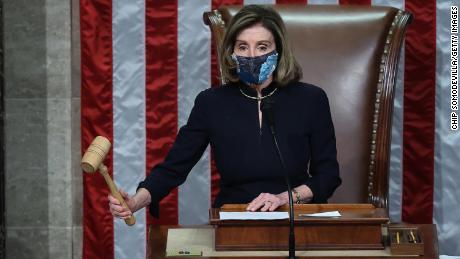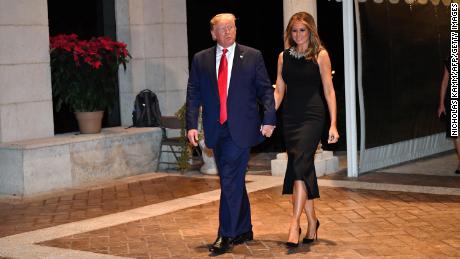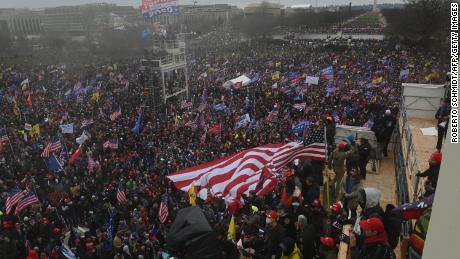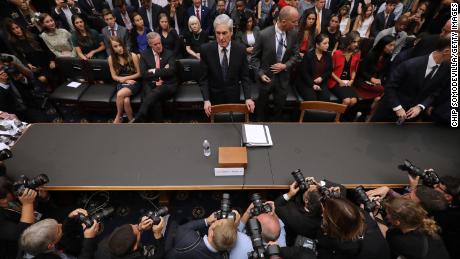Trump departs Washington a pariah as his era in power ends
“We will be back in some form,” Trump told a modest crowd of supporters who gathered to see him off at Joint Base Andrews. “So have a good life. We will see you soon.”
As Air Force One lifted off for a final time with Trump aboard, Frank Sinatra’s “My Way” blared in the background.
For his opponents, Trump’s departure amounts to a blissful lifting of a four-year pall on American life and the end to a tortured stretch of misconduct and indignities. Even many of Trump’s onetime supporters are sighing with relief that the White House, and the psychology of its occupant, may no longer rest at the center of the national conversation.
There is no evidence the President has reckoned with the consequences of his actions; the opposite appears to be true. He came to regret a concession video he had recorded at the urging of his family and advisers, who told him he was seriously close to being removed from office. In his first comments after the riot, he refused blame for it and insisted, falsely, that nobody believed his words ahead of it were at fault.
The events caused an already reclusive President, who had mostly given up running the country after losing the election, to retreat further. His near-silence was helped along by a permanent ban from Twitter, his long-preferred method of communication, a move that propelled him to rage.
He emerged for a final time on Wednesday, discarding tradition and boycotting his successor’s inauguration. Aides said he did not like the thought of leaving Washington an ex-president, nor did he relish the thought of requesting use of the presidential aircraft from Biden.
The ceremony was modest in scope, though it did include a red carpet, cordons of troops and a 21-gun salute. Before departing the White House, he offered a wave from his Marine One helicopter.
In a subdued, discursive speech on a windy tarmac, Trump made glancing references to his accomplishments in office but seemed bitter at his loss.
“I hope they don’t raise your taxes, but if they do, I told you so,” he said.
Aides had prepared a speech for the President that included references to the incoming administration and more gracious language about a peaceful transition, according to a person familiar with the matter.
But Trump discarded the speech, and teleprompters were removed from the stage before he arrived at Joint Base Andrews.
A person familiar with the matter said the decision was made after Trump read the remarks this morning at the White House.
“I wish the new administration good luck and great success,” Trump said. “I think they will have great success.”
He is expected to be ensconced in his South Florida club when he officially becomes an ex-president at noon.
Before he left, Trump did write the traditional handoff letter to Biden of the same type his predecessors wrote the men who replaced them. And he greeted residence staff at the White House who saw him off.
Trump is the first president in 150 years to stage such a boycott. While Pence will attend Biden’s swearing-in, other members of Trump’s family, including wife Melania and daughter Ivanka, will be absent. The decision is emblematic of a presidency animated by Trump’s highly fragile ego and run by officials whose chief concern was managing Trump’s feelings.
Freshly impeached for a second time, this time with support from a few Republicans, Trump ends his term with the lowest approval rating of his tenure. Republicans remain divided on whether he represents the future of their party. He’s been shunned by senior leaders in Congress, who were left aghast at his incitement of a mob that sent them running for safety inside the Capitol.
In his final days, Trump has been surrounded by a shrinking circle of associates, many of them decades younger. Old friends who used to speak with him regularly said they can no longer reach him — both literally, because he is refusing their calls, and figuratively, because those who are patched through describe a man lost in denial and detached from reality.
He even had a falling-out with his vice president, Mike Pence, whose characteristic fealty was severed after he heard nothing from Trump while mobs appeared to be hunting him during the insurrection attempt. The two men went for days without speaking after Trump uttered a vulgar curse because Pence refused to unilaterally overturn the election results.
They appeared to reconcile, but other senior Republicans began breaking with the President, including Senate Majority Leader Mitch McConnell and Rep. Liz Cheney, the No. 3 House Republican. Ten Republicans voted for his impeachment in the most bipartisan impeachment vote in history. While only two months ago Trump seemed assured of dominant influence within the GOP going forward, he has squandered at least some of his sway in his ignoble final acts as President. Now, enraged and seeking revenge, Trump has raised the idea of starting a new political party in recent days, a senior adviser said.
What’s next
Trump enters his post-presidency facing swirling legal matters and with the fate of his business empire in doubt. He will retreat for now to his private Mar-a-Lago club in Palm Beach, Florida, where he has established residency, though there are questions of whether he’ll be allowed to live there permanently.
Without some of the protections afforded him by the presidency, Trump will become vulnerable to multiple investigations looking into possible fraud in his financial business dealings as a private citizen. He faces defamation lawsuits sparked by his denials of women’s allegations that he assaulted them. And then there are claims he corrupted the presidency for his personal profit.
Even as he exits the White House, there is little question that Trump’s shadow will cloud the capital for the foreseeable future. The matter of his impeachment still lingers in the Senate, which will begin a trial after Biden is sworn in. And Trump’s influence on his party’s direction going forward will amount to a reckoning for conservatives, who now must decide whether theirs is the party of a president who incited an insurrection on his way out of office.
Trump has left the Republican Party in civil war. Its leadership remains handpicked by the outgoing President and many of its newest faces are acolytes and beneficiaries of Trump’s willingness to break with political norms. But others — including both those who worked for him and those who have long warned of his dangers — would rather Trump disappear forever, relegated to fringe politics and zoning disputes in Palm Beach.
The likelihood that happens seems slim. Trump has amassed hundreds of millions of dollars in a leadership PAC formed after the election that he will be able to use for future political activity, including boosting candidates. There are few restrictions on how the money can be used.
Whether he runs again himself also remains an open question; when he lost in November he signaled to those around him that he was likely to attempt a return to the White House in four years. But since then, officials have cast doubt on his intentions, suggesting instead he was more interested in keeping the potential 2024 GOP field in limbo rather than seriously contemplating another run.
Legacy in tatters
The results of Trump’s presidency are not particularly mixed. While there have been some achievements — a reshaped Supreme Court, a dismantled regulatory state and the brokering of diplomatic achievements in the Middle East — Trump’s overarching legacy is one of division and rancor capped by the catastrophic events of January 6, when he had 14 days left in his term.
From nearly the day he entered office, aides wondered whether he actually enjoyed the job of being president, its mundane daily tasks hardly a fit for a man who had never served in government, did not have much of an attention span and had previously expressed little interest in, say, health care policy or nuclear arms treaties.
“This is more work than in my previous life,” he told Reuters 100 days into the job. “I thought it would be easier.”
Trump had spent his previous decades cultivating a public profile as a savvy businessman and larger-than-life New York City mogul, despite a succession of bankruptcies and collapses. His second act as a reality television star with a penchant for race-baiting conspiracies (such as questioning President Barack Obama’s birthplace) led into his third act as president, and along with it an eye toward artifice and spectacle.
Trump’s experience as president was regularly frustrated by the limitations of the executive branch; steps he wanted to take were either illegal or met resistance from Democrats, who took control of the House of Representatives two years into his term.
Special counsel Robert Mueller’s investigation into Trump’s ties to Russia proved an immense distraction that preoccupied both the President and his White House. It resulted in the convictions of several Trump associates, many of whom he pardoned.
Instead of rising to the difficulties, Trump amended the job to fit his own liking. He mostly skipped reading lengthy intelligence documents, preferring in-person briefings that on some occasions left out important information about which Trump would later claim ignorance.
After attending most of the yearly world leader summits his first year in office and finding them a bore, Trump skipped the ones he deemed skippable in subsequent years, including the ASEAN summit at which America’s presence had been traditionally seen as a counterweight to China.
Most tragically, Trump showed little interest in leading the nation through the coronavirus pandemic, self-styling himself a “wartime leader” for a few days before reverting to downplaying the crisis and eventually pretending it did not exist. Even his own serious bout with the disease, which left him struggling to breathe and hospitalized, only seemed to strengthen his resolve to ignore it.
The more colorful trappings of the job interested him more. A fateful invitation to attend Bastille Day in Paris in 2017 turned Trump on to the thrills of a military parade, which he unsuccessfully lobbied for in Washington for another three years. He produced political spectacles at the Lincoln Memorial, Mount Rushmore and on the White House South Lawn, trampling presidential norms along the way.
But as he ran a dark and bitter campaign for reelection last year, even many of his advisers wondered whether he really wanted to serve another four years in office. He ignored entreaties on adjusting his political approach to better appeal to women and seniors, insisting throughout that what propelled him to power in 2016 — anti-immigrant race-baiting, stoking of class grievances and general fear-mongering — would work again.
He never adjusted to the reality that “Make America Great Again” lost its luster when uttered by an incumbent who’d already had four years to deliver. And amid a life-altering pandemic, he did not seize the opportunity to actually lead the nation through its most trying stretch in memory.
Now, the capital and the country, led by President Joe Biden, go about the work of picking up the pieces.
![]()










